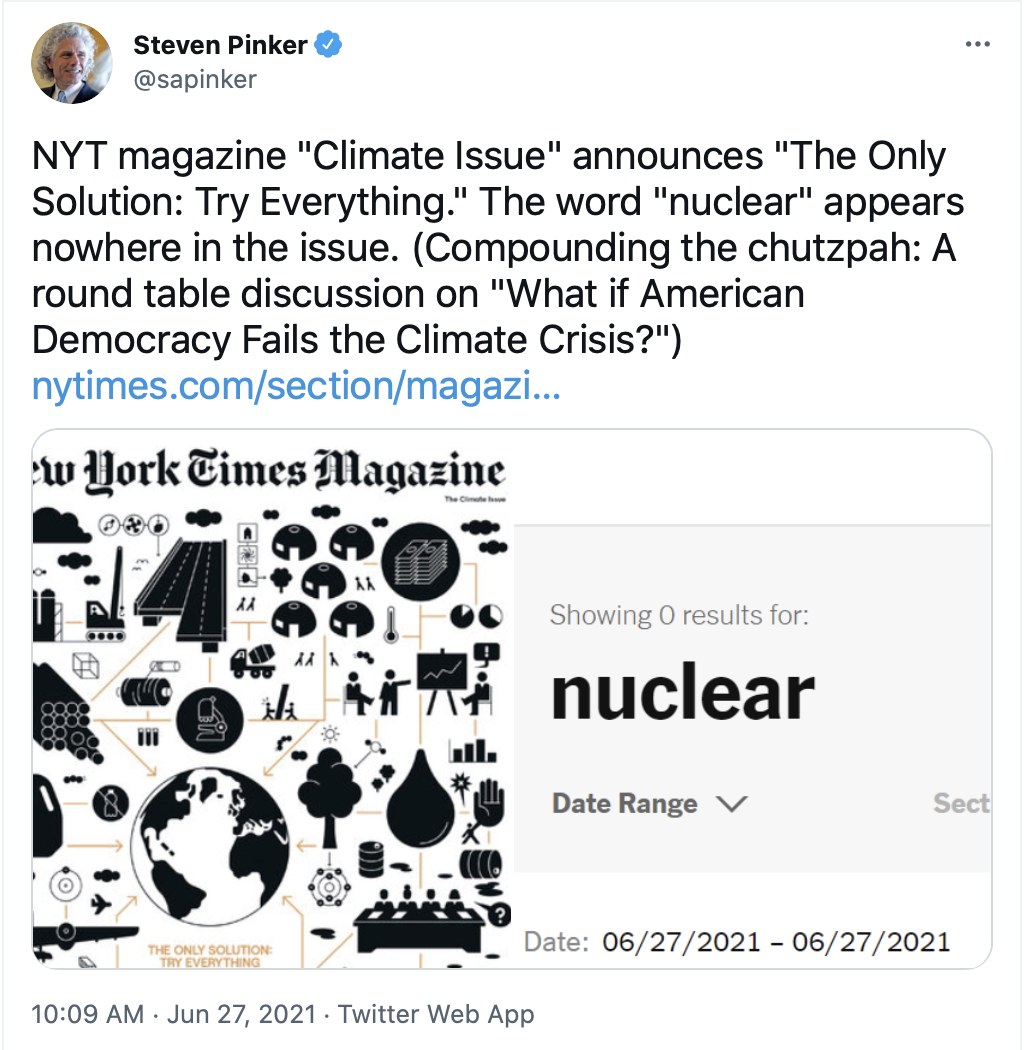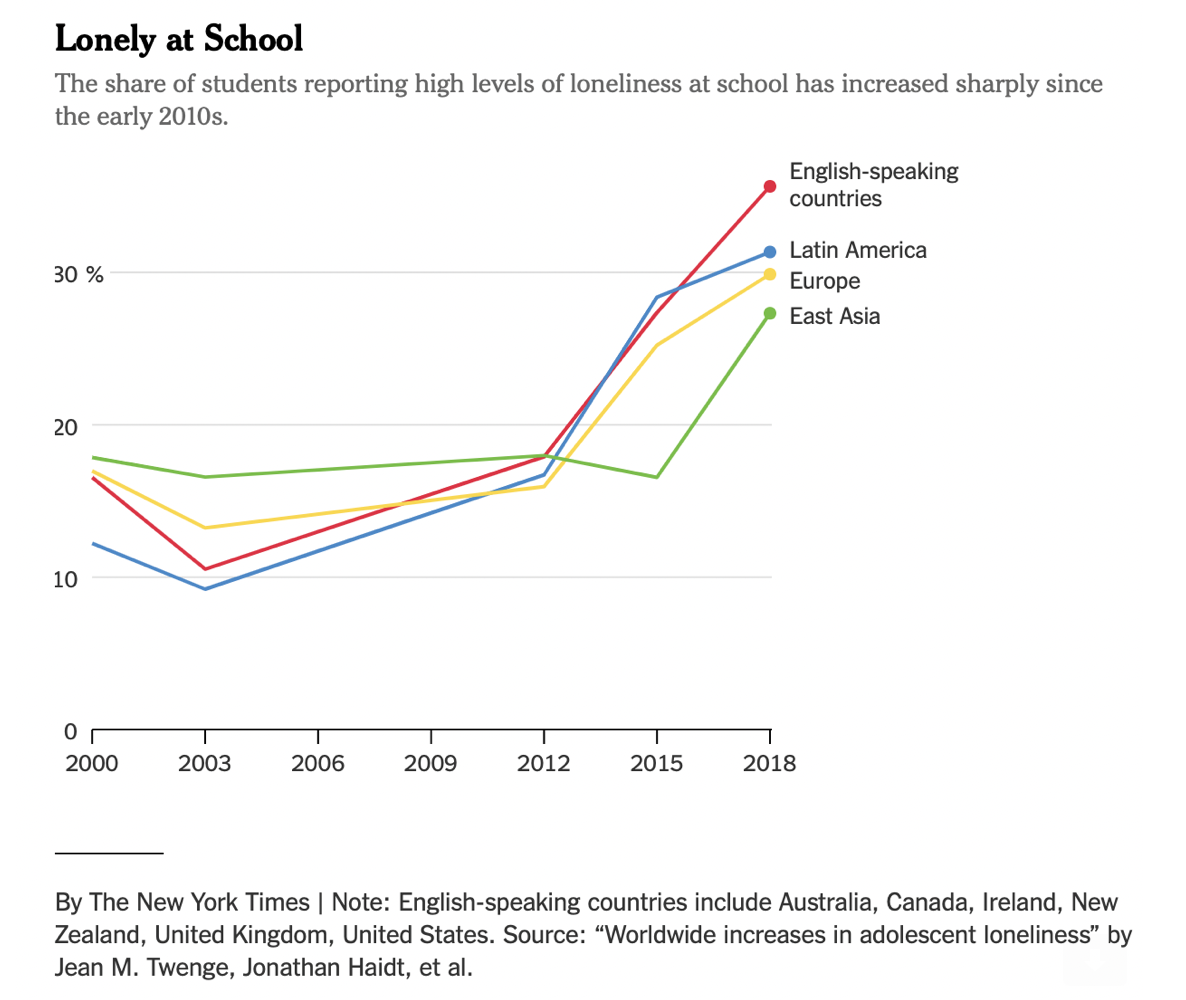There is no good faith explanation for the failure of the NYT to discuss nuclear power. Nor is there any good faith explanation for failing to discuss the discouraging real-life science-based numbers re the % of U.S. energy usage that could realistically be replaced by wind and solar.

Michael Schellenberger discusses the missed opportunity:
The underlying reason for the failure of Biden’s ambitious climate plans is that progressives remain dogmatically pro-renewables and anti-nuclear. After I and a handful of others spent much of 2019 criticizing Rep. Alexandria Ocasio-Cortez for her anti-nuclear Green New Deal, she said in May of that year that she would “keep the door open” on nuclear power. But in October she advocated the closure of New York’s Indian Point nuclear plant. When the plant closed earlier this year, natural gas use and carbon emissions increased, as my colleagues and I had long predicted. Had Biden advocated the increase of nuclear power from today’s 19 percent to 50 percent of America’s electricity by 2050, he would have won Republican support, and America would be on a path to significantly reduced emissions.
Schellenberger also discusses the reasons the US is missing the opportunity to actually do something about fossils fuels, especially the fear that nuclear power plants will be over budget (something many other countries are willing to figure out):
The public interest case for nuclear power is obvious. Building nuclear power plants that can last 80 or 100 years is much more similar to building roads and bridges than it is to importing from China solar panels that last just 10 or 20. And taking responsibility for the peaceful use of our most dangerous technology, the only one that truly poses an apocalyptic threat to human civilization, rather than let China and Russia control it, is obviously in America’s national security interests.
From an environmental point of view, safely managing and eventually re-using used nuclear fuel rods at the site of production is much closer to the “circular economy” vision of permanent recycling than to the reality of solar waste disposal, which turns out to involve either dumping flimsy used solar panels on poor Africansor paying four times more for solar electricity than progressives had claimed.
Progressive support for nuclear has grown quickly. Two progressive and socialist science writers, Will Boisvertand Leigh Phillips, spoke out forcefully and insightfully in support of nuclear, in 2013 and 2016. This year, two socialists, Emmet Penney and Bhaskar Sunkara, made the economic and climate case for nuclear power.
Unfortunately, most mainstream news reporters remain hostile to nuclear energy and they reach many more people. They repeat the same false claims that there is something so terribly complicated about nuclear plants that we can’t build them, even as they are built all over the world.
But all infrastructure projects are over-budget, and everybody in construction knows this. Even people who have renovated a kitchen know this. The UK-France tunnel under the English Channel was $3.6 billion over budget. The International Space Station program is tens of billions of dollars over budget. And the Sochi Winter Olympics were $39 billion over budget.
I was once a big fan of solar panels. It seemed like we would be getting electricity for almost free. That was before reality set in. Here's Michael Schellenberger discussing the big problems with solar:
But a major new study of the economics of solar, published in Harvard Business Review (HBR), finds that the waste produced by solar panels will make electricity from solar panels four times more expensive than the world’s leading energy analysts thought. “The economics of solar,” write Atalay Atasu and Luk N. Van Wassenhove of Institut Européen d'Administration des Affaires, one of Europe’s leading business schools, and Serasu Duran of the University of Calgary, will “darken quickly as the industry sinks under the weight of its own trash." . . . .
The problem is the sheer quantity of the hazardous waste, which far exceeds the waste produced by iPhones, laptops, and other electronics. The volume of waste expected from the solar industry, found a team of Indian researchers in 2020, was far higher than from other electronics.
“The totality of these unforeseen costs could crush industry competitiveness,” conclude the HBR authors. “If we plot future installations according to a logistic growth curve capped at 700 GW by 2050 (NREL’s estimated ceiling for the U.S. residential market) alongside the early replacement curve, we see the volume of waste surpassing that of new installations by the year 2031.”
It’s not just solar. “The same problem is looming for other renewable-energy technologies. For example, barring a major increase in processing capability, experts expect that more than 720,000 tons worth of gargantuan wind turbine blades will end up in U.S. landfills over the next 20 years. According to prevailing estimates, only five percent of electric-vehicle batteries are currently recycled – a lag that automakers are racing to rectify as sales figures for electric cars continue to rise as much as 40% year-on-year.”
But the toxic nature of solar panels makes their environmental impacts worse than just the quantity of waste. Solar panels are delicate and break easily. When they do, they instantly become hazardous, and classified as such, due to their heavy metal contents. Hence, used solar panels are classified as hazardous waste. The authors note that “this classification carries with it a string of expensive restrictions — hazardous waste can only be transported at designated times and via select routes, etc.”
This is a frustrating topic for me because the high level of hypocrisy by those who claim to be concerned about the environment. I have many left-leaning friends who claim that the environmental issues we face, including energy issues, are "dire." They've been saying this for a decade, yet most of them do nothing in their personal lives to change that situation. This hypocrisy is rampant among Democrats, and it looks like Joe ens new infrastructure package will do next to nothing to reduce carbon emissions. Nuclear will still be on life support, even though it is our most promising technology.
The people who claim the be the most concerned about carbon will continue to put their furnaces and AC on high, as they always have (I know almost know one who will sacrifice comfort (or even wear a sweater in the winter) for the sake of the environment. People will blithely continue to take jobs requiring long commutes in their large cars, many of which have pathetic gas mileage. They will continue taking long trips in cars and jets (I'm guilty of this one). When is the last time (if ever) that you've ever heard another American refuse to burn fossil fuel for the sake of "the environment"? I would challenge anyone to tell any difference between Democrats and Republicans on environmental issues based on their conduct. At least many conservatives are honest, when they say they have no intention of changing their conduct to reduce consumption of fossil fuels. We, the left-leaning American people, left-wing media and "progressive" politicians, talk a loud game about the environment. But if action really speaks louder than words, the only thing we can confidently conclude is that most of us on the left don't give a shit about "the most pressing existential issue of our day."



